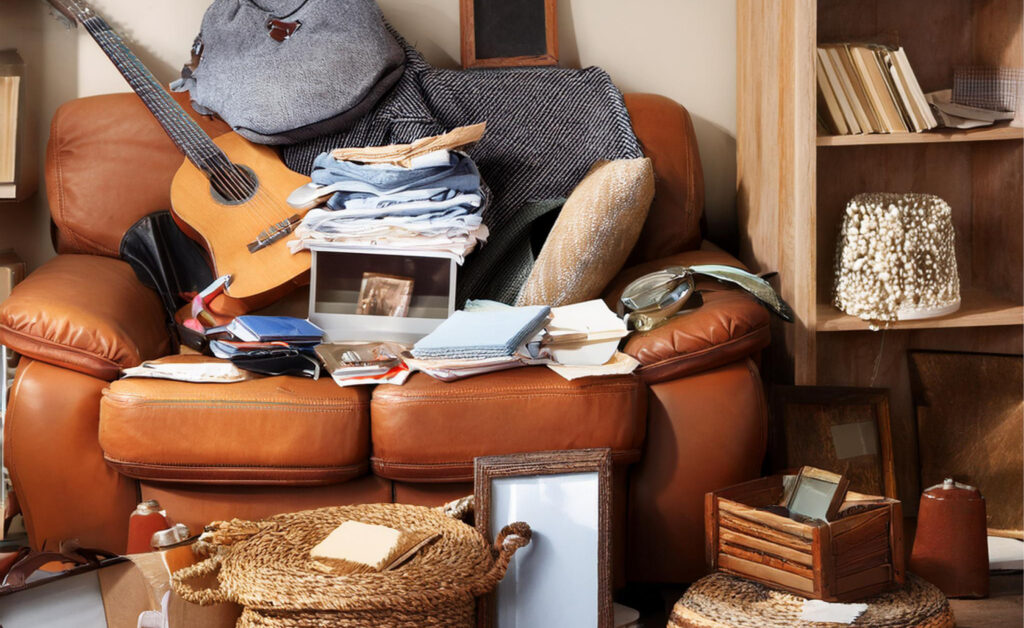Words Amy Joy Mistal, SOUL EASE Professional Organizing
When you think about stress management, what comes to mind? Yoga? Meditation? An expensive getaway? What if I told you that one of the most effective ways to ease your stress might be sitting in plain sight? More specifically, it’s likely piled up on tables, tucked in overpacked closets, or scattered across your countertops. Yes, we’re talking about clutter – and its surprising impact on your mental health.
Clutter isn’t just an annoyance or aesthetic concern. Research shows that too much stuff in our physical space directly impacts our mental space. Here’s how clutter affects us, how to know if it’s taking a toll, and actionable tips to reclaim your calm by decluttering your life.
The Clutter-Stress Connection
Have you ever walked into a messy room and immediately felt your energy drain? That’s not just in your head – it’s science. A study conducted by researchers at UCLA found that high levels of clutter in the home correspond to elevated levels of cortisol, the stress hormone. When your brain perceives clutter, it signals chaos and disorder, which can make it harder to focus, relax, or even sleep.
Clutter also bombards our senses with excessive stimuli, making it difficult to concentrate. Over time, this sense of being overwhelmed can lead to chronic anxiety, decreased productivity, and a sense of frustration with our environment – and ourselves.
Signs Your Clutter Is Affecting You
Clutter’s impact isn’t always obvious. Here are some subtle signs that your stuff might be stressing you out:
- Procrastination: Are you putting off simple daily tasks because your environment feels too chaotic?
- Feeling “Stuck:” Does it feel like you can’t move forward, either emotionally or physically, because you’re paralyzed by all the “things” you’ve collected?
- Fatigue: Clutter competes for your mental energy, leaving you drained without doing much.
- Disorganization Spirals: Do you often lose items, miss appointments or forget to pay bills simply because the clutter makes you feel disoriented?
If any of these sound familiar, it might be time to take a closer look at how clutter is seeping into your mental and emotional well-being.
Emotional Clutter: More Than Just Stuff
Decluttering isn’t just about throwing things away – it can be a deeply emotional process. Often, our belongings carry sentimental value or represent a version of ourselves we’re unwilling to part with. That dress you haven’t worn in five years? It might symbolize the youth or lifestyle you wish to hold onto. Those piles of unread books? They might stand for a future you that’s more organized and well read.
To tackle this emotional clutter:
- Start small. Choose one item you can part with and notice any resistance you feel.
- Reframe your mindset. Instead of focusing on what you’re losing, think about what you’re gaining – a clearer mind, space for new beginnings, or simply less stress.
- Practise gratitude. Honour the memories an item represents, but remind yourself that memories live within you, not the objects themselves.
Simple Shifts for a Calmer Home
At this point, you might be wondering where to start. Here are some simple yet effective strategies to help you move from chaos to calm:
1. Declutter One Small Space
Start small – like a single drawer or shelf – and use it as momentum. The satisfaction of completing a tiny task can give you the motivation to tackle bigger projects.
2. Use Calming Organizing Tools
Opt for storage solutions in soft, neutral tones – they subconsciously signal order and tranquility. Baskets, clear bins and labeled containers can make even hidden storage feel calm and functional.
3. Practise Reset Rituals
Dedicate a few minutes each day to resetting your space. Whether it’s fluffing the pillows on your couch or tidying your desk at the end of the day, these small rituals can bring immediate relief and keep clutter from building.
4. Apply the “One-In, One-Out” Rule
For every new item you bring into your home, commit to letting go of one you no longer need.
Decluttering isn’t just about appearances – it’s about living a calmer, more intentional life. If your stuff is affecting your stress levels, taking even simple steps toward organization can have profound effects on your mental health.
www.amyjoymistal.com




